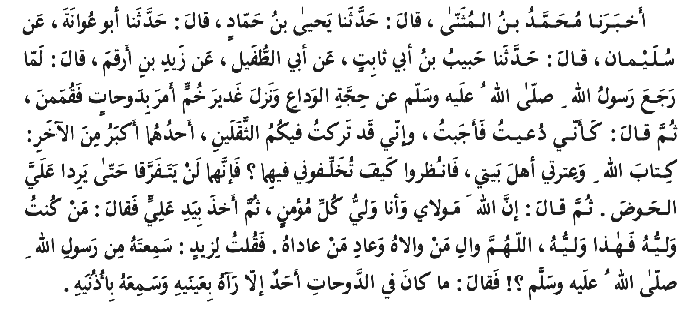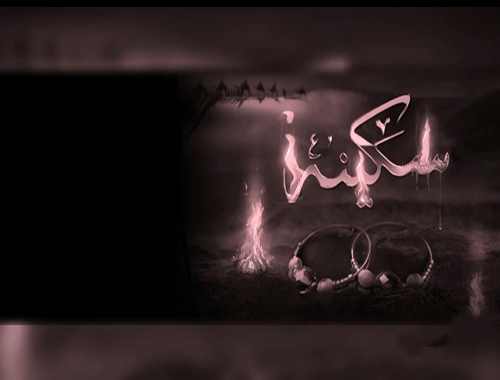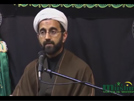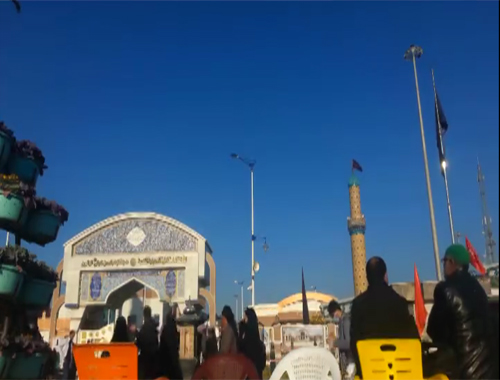The Various Occasions Related to Hadith alThaqalayn - 2. At Ghadir Khumm:
- Details
- Hits: 5503
Article Index
2. At Ghadir Khumm:
AlNasa'i in his alSunan alkubra, 96, No. 79, records the following tradition in the chapter "Khasa'is `Ali":

AlNasa'i narrates from Muhammad ibn alMuthanna, he from Yahya ibn Hammad, from Abu 'Uwwanah, from Sulayman, from Habib ibn Abi Thabit, from Abu alTufayl, from Zayd ibn Arqam, who said, "When the Messenger of Allah (A) returned from the last hajj and came down at Ghadir Khumm....
"Then he declared: 'I am about to answer the call (of death). Verily, I have left two precious things (thaqalayn) among you, one of which is greater than the other: the Book of God and my `Itrah, my Ahl alBayt. So watch out how you treat them after me. For, indeed, they will never separate until they return to me by the side of the Pond.' Then he said, 'Verily, God is my master (mawlaya) and I am the wali of every believer.' Then he took `Ali's hand and declared, 'To whomever I am his wali, this one is also his wali. My God, befriend whoever befriends him and be hostile to whoever is hostile to him.'" Abu alTufayl says: "I said to Zayd, 'Did you hear it from the Prophet(S)?' He replied, 'There was no one in the caravan who did not see it with his eyes and hear it with his ears,'"
Khasa'is `Ali is part of alNasa'i's alSunan alkubra as shown by the 3rd volume of the MS in the king's collection in Morocco, written in 759/1358 folios 81-117. See also in this regard the introduction of alKhasa'is (Kuwait: Maktabat alMu`alla, 1406), ed. by Ahmad Mirayn Balushi. The editor states that this tradition is sahih and its transmitters are thiqah.
Among others who have recorded it in their books are:
Al-Bukhari, alTa'rikh alkabir, iii, 96;
Muslim, Sahih, bab fada'il `Ali, no. 2408;
Ahmad, Musnad, iii, 17, iv, 366;
`Abd ibn Humayd, Musnad, no. 265;
Ibn Sa`d, and
Abu Ya`la from Abu Sa`id, as mentioned in Jam` aljawami` and Kanz al`ummal;
Ishaq ibn Rahwayh, in his Sahih., as mentioned by Ibn Hajar in alMatalib al`aliyah, iv, 65, no. 1873, where he states that its isnad is sahih, and also by al-Busayri in Ithaf alsadah (MS in Topcopi Library, vol. 3, F.55b) who, too, considers the isnad as sahih;
Ibn Khuzaymah, Sahih, MS in Topcopi Library, F.240;
alDarimi, Sunan, ii, 310, no. 2319;
Abu Dawud, Sunan, as mentioned in Sibt ibn alJawzi, Tadhkirat khawass al'ummah, 322;
Abu 'Uwwanah, Musnad, as mentioned in alShaykhani, alSirat alsawi;
alBazzaz, from Umm Hani, as mentioned in Wasilat alma'al;
Ibn Abi 'Asim, Kitab alSunnah, 629, no. 1551, 630, no. 1555, 629, no. 1551;
alYa`qubi, Ta'rikh, ii, 112;
alBaladhuri, Ansab al'ashraf, 110, no. 48, the biographical account of `Ali (A);
alHafiz alHasan ibn Sufyan alNasawi, the author of Musnad, from Hudhayfah ibn Usayd, as mentioned by Abu Nu`aym, alHilyah, i, 355,
alFasawi, alMa`rifah wa alta'rikh, i, 536;
Ibn Jarir alTabari, from Hudhayfah ibn Usayd, Zayd ibn Arqam (with alNasa'i's wording as well as with the wording of Muslim), Abu Sa`id alKhudri, as cited in Jam` aljawami`, ii, 357, 395, Kanz al-`ummal, 12911, xiii, 36441, 36340, 37620, 37621, 36341, Jami` al-'ahadith, vii, 14523, 15112, 15122, 15113, iv, 7773, 8072, 8073;
alDulabi, alDhurriyyat altahirah, no. 228;
alHafiz alTahawi, Mushkil al 'athar, ii, 307, iv, 368;
alHakim alTirmidhi, Nawadir al-'usul, from Hudhayfah ibn Usayd;
alTabarani, alMu`jam alkabir, iii, 2679, 2681, 2683, 3052, v, 4969, 4970, 4971, 4986, 5026, 5028;
alHakim, alMustadrak `ala alSahihayn, iii, 109, 110 where he expressly states, as mentioned above, that the tradition is sahih in accordance with the criteria of alBukhari and Muslim; alDhahabi has confirmed his judgement;
Abu Nu`aym, Hilyat al'awliya', i, 355, ix, 64;
alBayhaqi, alSunan alkubra, ii, 148, vii, 30, x, 114;
alKhatib, Ta'rikh Baghdad, viii, 442;
Ibn alMaghazili, Manaqib Amir alMu'minin (A), 23;
Ibn `Asakir, Ta'rikh Dimashq, ii, 45, no. 547, the biographical account of `Ali (A), and v, 436 of Badran's edition in the biographical account of Zayd ibn Arqam;
alBaghawi, Masabih alSunnah, ii, 205 and Sharh alSunnah (MS in Topcopi Libary, vol. 2, F. 718), bab Manaqib Ahl alBayt;
Ibn al'Athir, Usd alghabah, iii, 92 in the biographical account of 'Amir ibn Layla, no. 2727;
Ibn Hajar, al'Isabah in the biographical account of 'Amir;
al-Mizzi, Tuhafat al'ashraf, iii, 203, no. 3688 from Muslim and alNasa'i;
alDiya' alMuqaddisi, alMukhtarah, as cited by alSamhudi and alSakhawi;
Ibn Taymiyyah, Minhaj alSunnah, iv, 85;
al-Dhahabi, Talkhis alMustadrak, iii, 109;
Ibn Kathir, alBidayah wa alnihayah, v, 209, vi, 199, from alNasa'i, where he quotes alNasa'i's statement that this narration is sahih;
alKhazin, Tafsir under verses 42:23 and 3:103;
alMulla, Wasilat almuta`abbidin, v, 199;
al-Haythami, Majma` alzawa'id, ix, 163 from Zayd, 164 from Hudhayfah.











